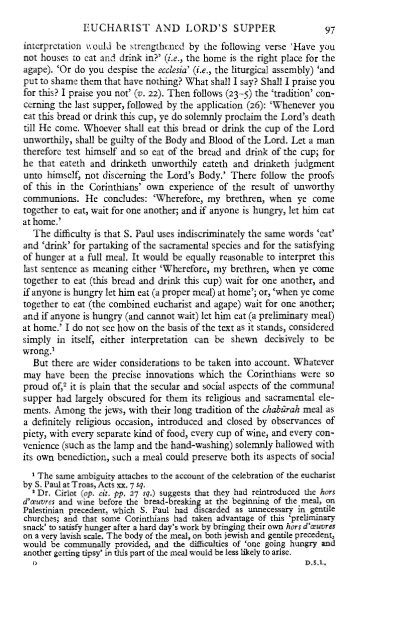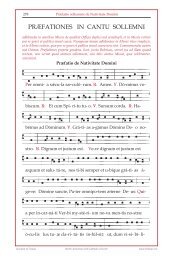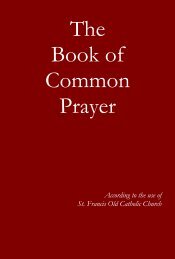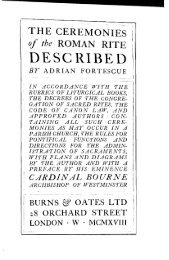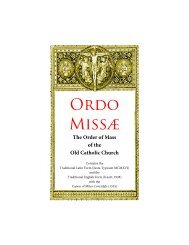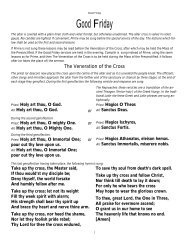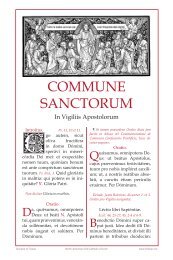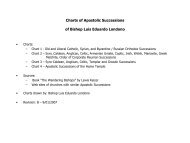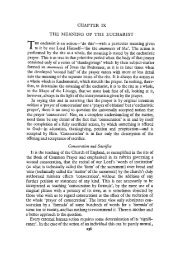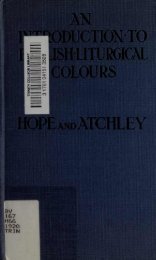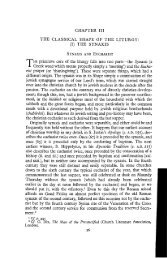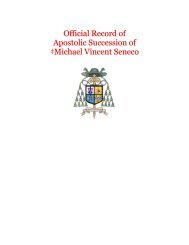Eucharist and Lord's Supper
Eucharist and Lord's Supper
Eucharist and Lord's Supper
Create successful ePaper yourself
Turn your PDF publications into a flip-book with our unique Google optimized e-Paper software.
EUCHARIST AND LORD'S SUPPER 97<br />
interpretation "iould be strengthened by the following verse 'Have you<br />
not houses to eat <strong>and</strong> drink in?' (i.e., the home is the right place for the<br />
agape). 'Or do you despise the ecclesia' (i.e., the liturgical assembly) '<strong>and</strong><br />
put to shame them that have nothing? What shall I say? Shall I praise you<br />
for this? I praise you not' (v. 22). Then follows (23-5) the 'tradition' concerning<br />
the last supper, followed by the application (26): 'Whenever you<br />
eat this bread or drink this cup, ye do solemnly proclaim the <strong>Lord's</strong> death<br />
till He come. Whoever shall eat this bread or drink the cup of the Lord<br />
unworthily, shall be guilty of the Body <strong>and</strong> Blood of the Lord. Let a man<br />
therefore test himself <strong>and</strong> so eat of the bread <strong>and</strong> drink of the cup; for<br />
he that eateth <strong>and</strong> drinketh unworthily eateth <strong>and</strong> drinketh judgment<br />
unto himself, not discerning the <strong>Lord's</strong> Body.' There follow the proofs<br />
of this in the Corinthians' own experience of the result of unworthy<br />
communions. He concludes: 'Wherefore, my brethren, when ye come<br />
together to eat, wait for one another; <strong>and</strong> if anyone is hungry, let him eat<br />
at home.'<br />
The difficulty is that S. Paul uses indiscriminately the same words 'eat'<br />
<strong>and</strong> 'drink' for partaking of the sacramental species <strong>and</strong> for the satisfying<br />
of hunger at a full meal. It would be equally reasonable to interpret this<br />
last sentence as meaning either 'Wherefore, my brethren, when ye come<br />
together to eat (this bread <strong>and</strong> drink this cup) wait for one another, <strong>and</strong><br />
if anyone is hungry let him eat (a proper meal) at home'; or, 'when ye come<br />
together to eat (the combined eucharist <strong>and</strong> agape) wait for one another;<br />
<strong>and</strong> if anyone is hungry (<strong>and</strong> cannot wait) let him eat (a preliminary meal)<br />
at home.' I do not see how on the basis of the text as it st<strong>and</strong>s, considered<br />
simply in itself, either interpretation can be shewn decisively to be<br />
wrong.!<br />
But there are wider considerations to be taken into account. Whatever<br />
may have been the precise innovations which the Corinthians were so<br />
proud of,2 it is plain that the secular <strong>and</strong> social aspects of the communal<br />
supper had largely obscured for them its religious <strong>and</strong> sacramental elements.<br />
Among the jews, with their long tradition of the chaburah meal as<br />
a definitely religious occasion, introduced <strong>and</strong> closed by observances of<br />
piety, with every separate kind of food, every cup of wine, <strong>and</strong> every convenience<br />
(such as the lamp <strong>and</strong> the h<strong>and</strong>-washing) solemnly hallowed with<br />
its own benediction, such a meal could preserve both its aspects of social<br />
1 The same ambiguity attaches to the account of the celebration of the eucharist<br />
by S. Paul at Troas, Acts xx. 7 sq.<br />
• Dr. Cidot (op. cit. pp. 27 sq.) suggests that they had reintroduced the hOTS<br />
d'ceuvres <strong>and</strong> wine before the bread-breaking at the beginning of the meal, on<br />
Palestinian precedent, which S. Paul had discarded as unnecessary in gentile<br />
churches; <strong>and</strong> that some Corinthians had taken advantage of this 'preliminary<br />
snack' to satisfy hunger after a hard day's work by bringing their own hOTS d'ceuvTes<br />
on a very lavish scale. The body of the meal, on both jewish <strong>and</strong> gentile precedent,<br />
would be communally provided, <strong>and</strong> the difficulties of 'one going hungry <strong>and</strong><br />
another getting tipsy' in this part of the meal would be less likely to arise.<br />
n<br />
D.S.L.


